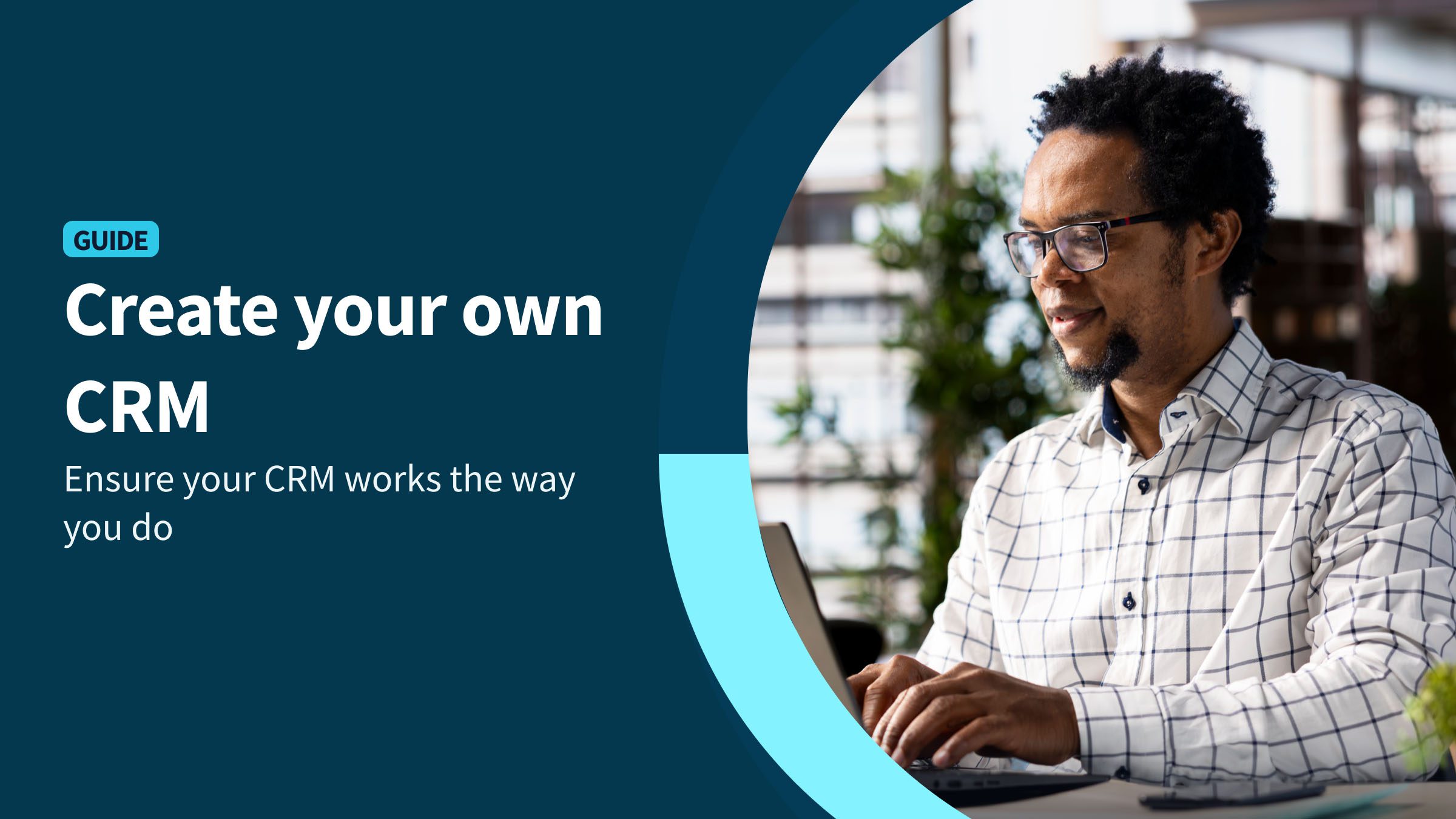The only way for your business to keep up in today’s fast-paced world is by unleashing the power of automation.
Implementing an automated CRM system is the most efficient way to reap the benefits of automation and propel your business forward.
But what exactly is CRM automation?
In this article, you’ll learn everything you need to know about CRM and automation and how to integrate CRM system automation into your processes without interrupting your current workflows.
What is a CRM?
Before jumping into the specifics of automated CRM systems, let’s get back to basics and review what CRM is.
CRM stands for customer relationship management and mainly helps you manage your customers and how they interact with your business.
Why implement a CRM solution?
A CRM solution enhances your customer relationship management by adding structure to your processes and keeping you organized.
You’ll find that the right CRM solution improves your overall workflow management by integrating with your various business processes.
Areas that you’ll see your CRM solution improve include:
- Sales management.
- Project management.
- Documentation management.
No matter what you’re looking for in a solution, the one element you should always look for is CRM automation.
What is CRM system automation?
CRM automation is a way of automating repetitive, manual tasks related to your customer relationship management.
These tasks may include:
- Scheduling follow-ups.
- Collecting payment.
- Tracking customer data.
How to set up an automated CRM system
The best CRM systems rely on automation to simplify your processes and increase productivity.
To get started, you must first choose the software that best aligns with your current business operations.
Think about your current customer journey. While CRM system automation assists with the entire customer journey, it’s helpful to determine your weakest points that need the most improvement.
Maybe customer follow-ups aren’t as timely as you’d like. Or perhaps you have trouble segmenting your contacts and keeping track of each customer’s needs.
Whatever your weakest point is will be a starting point for setting up CRM system automation.
Let’s take a look at the benefits of an automated CRM system.
What are the benefits of an automated CRM system?
Software tools are a significant investment. When considering any new system, the main question is: How will this benefit my business?
With CRM system automation, the possibilities are endless.
This software provides benefits beyond customer management by combining your workflows to enhance all aspects of your business.
Below are four benefits an automated CRM system brings to your business.
Simplified task tracking
Oddly enough, it’s easy to lose track of repetitive tasks. It can also be bothersome to ensure all simple tasks get done accurately.
CRM system automation takes on that burden by simplifying your everyday manual tasks, such as:
- Lead collection.
- Data entry.
- Appointment scheduling.
From there, it’s easy to track progress in all areas of your business from a single platform.
Centralized sales progress tracking
An automated CRM system lets you keep track of sales progress and other business workflows in one place.
Moreover, a centralized system ensures your business stays organized and cohesive.
Any sales rep can pull up up-to-date customer information and pick up from where the last teammate left off, allowing for a smooth transition for your customer.
When all your sales reps have access to the same information in real time, they’re empowered to serve your customers better and move forward as a team.
Increased sales opportunities
Once you automate your repetitive tasks and better organize your business, you’ll end up with more hours in the day.
What do you do with that extra time? Look for new sales opportunities!
CRM software saves you time that you can reinvest into your sales efforts to continue to grow your business.
Better yet, as those opportunities come in, the right CRM organizes your leads and tracks them through the sales pipeline, ensuring that nothing slips through the cracks.
Better communication
A large part of customer relationship management is communicating with your prospects and customers.
You never want to forget to follow up with a hot lead. Even worse, a miscommunication with a customer can lead to a dispute and negatively impact your business.
The best CRM gives you advanced tools to automate and streamline communication with your contacts. These tools may include automatic customer follow-ups and an online portal to give your customers a self-service option.
The benefits listed above are thanks to certain features found in automated CRM systems. Let’s explore those features.
Essential features of CRM system automation software
CRMs come with various features that allow you to integrate automation into your business workflow.
When looking for an automated CRM system, you should look out for three particular automation features:
- Automated data syncs.
- Advanced customization.
- Native integrations.
Automated data syncs
If you use several different sales tools, some of the data in those platforms is likely repetitive.
Relying on manual data entry is a mistake that forces double data entry, which can result in confusion and inconvenience for your team.
Double data entry is not only tedious but also raises issues if your team members don’t all have access to the same information.
To avoid this dilemma, you should choose a CRM solution with automated data syncs between your different platforms. That way, you never have to update information across all platforms manually.
It’s a bonus if your CRM can connect to your software stack to ensure that data flows seamlessly.
Advanced customization
Even if your CRM has impressive automation features, your business has unique needs that you may not meet with a strictly out-of-the-box solution.
That’s why you should seek an automated CRM system that you can tailor to your business needs.
Better yet, a no-code solution allows you to personalize your software without the help of a programmer.
Native integrations
You can think of an automated CRM system as a single tool that connects your software stack.
To avoid disrupting your business flow, choose a CRM system that integrates with your existing tools.
Some standard CRM integrations include:
- Accounting software, such as QuickBooks and Xero.
- Google Workspace, including Gmail and Google Calendar.
- Email marketing platforms such as Mailchimp.
As a result, you gain access to all your favorite tools in one central location and create a fluid system to operate your business.
With all this new information on CRM system automation, you might wonder where marketing automation fits into all of this. Let’s find out!
Do you need separate CRM and marketing automation software?
Many businesses keep their marketing and sales efforts separate and use different tools for each. As CRM is primarily a sales tool, many people don’t consider using it for marketing.
However, you risk missing out on opportunities when treating marketing and sales as two separate workflows.
Let’s compare CRM and marketing automation better to understand the importance of each for your business.
Marketing automation vs. CRM automation
Before jumping into why you should combine your sales and marketing processes, let’s start by explaining what marketing automation software is.
Marketing automation software
Marketing automation software streamlines your marketing processes to get more eyes on your business.
These processes may include:
- Lead capturing
- Lead segmentation.
- Marketing campaign management.
For example, with an automated marketing system, you can schedule email drip campaigns and watch your leads progress deeper down the sales funnel.
Once those prospects become customers, your CRM system takes over much of the work – but not all.
CRM automation software
As mentioned, CRM system automation focuses on improving your business’s customer relationship management.
However, CRM and marketing aren’t independent of one another. They rely on each other, and your business relies on them working harmoniously to foster growth.
An example of where marketing and CRM automation intersect is organizing your contacts.
Leverage CRM to keep your leads and customers separate to keep track of your business’s progress and potential.
Beyond that, and although a prospect ideally converts to a customer, you still want to market to them through sales or promotions your company may be having.
The best solution is to integrate your marketing automation platform and automated CRM system.
How to integrate CRM and marketing automation software
If you already have a favorite marketing tool, a CRM that allows integrations is the best way to combine your sales and marketing workflows.
However, you may not need a separate marketing automation tool at all.
Some CRMs come with marketing automation features that may be enough to execute your marketing strategy.
One significant marketing feature is web-to-lead forms that you can embed into your website to capture potential customer information and drive new leads.
Another CRM automation feature to look out for is email marketing. A great, automated CRM system allows you to create personalized email campaigns to win over prospective customers.
The best part is that your email analytics can be found in the same place as the rest of your reporting data, making it easy to compare and contrast your efforts and results.
Is CRM system automation suitable for your business? Yes! In fact, every business can benefit from a CRM.
Who should be using CRM automation?
CRM software is all about making it easier to manage every external interaction and relationship essential for business success.
If your business has customers you have to interact with, you should leverage CRM system automation.
That said, the way you use CRM automation will depend on the nature of your business and the best practices in your industry.
Industries leveraging automated CRM systems
The way CRM system automation is used varies from business to business and industry to industry.
For better context, let’s break down how different industries use automated CRM systems.
Manufacturing
Processing and fulfilling orders are the bread and butter of the manufacturing industry. So any software that a manufacturer uses should simplify this process.
A CRM combines your customer information and order information to keep track of each customer’s order.
That way, you can pull up the relevant information to quickly update customers inquiring about their order status.
A CRM allows you to conduct several tasks from one place, including:
- Create sales orders.
- Calculate shipping costs.
- Generate invoices.
As an automated CRM system provides a single database from which all team members can access up-to-date information, your sales team and backroom are always aligned.
In turn, this increases the accuracy of order fulfillment.
Construction
A lot of behind-the-scenes work goes into construction – from managing documents to communicating with clients.
A CRM system for construction simplifies these tasks, allowing you to shift your focus to the job at hand.
Construction companies need an automated CRM system that keeps contact details organized to provide a complete picture of their clients. When client details automatically update in your records, it’s much easier to manage your clients and jobs.
Since no two construction jobs are the same, your chosen CRM should reflect that aspect of the industry.
Customization allows you to add custom fields and ensure that your software solution can handle any job you take on.
Better yet, since construction managers are always on the go, a CRM with a mobile app is essential to find the information you need at all times.
Accounting
For accountants, a CRM with accounting integrations is non-negotiable.
An automated CRM system enhances the accounting capabilities of any business, making an accountant’s job easier and more efficient.
This is because a CRM allows you to store more customer information than simple accounting software, giving you a 360-degree view of each client.
If your CRM syncs with your accounting tools, there’s no need for double data entry. You’ll always have the latest client information shown on each platform.
Plus, a CRM gives you a place to store leads and opportunities, keeping your accounting solely for sales and revenue.
Non-profit
Non-profit organizations need the most efficient tools possible to spend less time on administrative tasks and more time making a difference.
A CRM allows you to automate several everyday non-profit tasks, such as data entry and donation acceptance, so you never lose track of your organization’s goals.
Keep track of your donors’ history and set up automated thank you messages to ensure no donation goes unappreciated.
Eager to have an automated CRM system of your own? Let’s go over the next steps.
How do I get started with CRM automation?
To get started with CRM automation, you must first choose the right CRM for your business.
Factors that you should consider when choosing a CRM include:
- Business needs: Think about where your business can improve.
- Sales strategies: Determine how a CRM fits into your current plans or whether you have to make some changes.
- The tools you already use: Ensure that your CRM of choice integrates with your other tools for optimal automation.
You should always test-drive a solution before committing to ensure it is the right solution for your business.
In fact, you can test out your first CRM right now!
Method: An all-in-one CRM system automation
As the #1 QuickBooks CRM, Method automates every aspect of your business. At the heart of its automation capabilities is the two-way QuickBooks and Xero sync.
Here’s how it works: Every time you make a change in Method, it automatically updates in your accounting software, and vice versa.
The effects of this are:
- Real-time updates across your business.
- No more double data entry.
- Hours saved on manual tasks.
But that’s just the beginning!
Method allows you to build stronger relationships with your customers by:
- Giving you a 360-degree view of their data.
- Helping you deliver excellent customer service with automated follow-up emails.
- Empowering your customers to self-service with only portals.
Method also integrates with a variety of tools that you know and love, including:
- Gmail.
- Outlook.
- Google Calendar.
- Paypal.
- Mailchimp.
- Zapier.
What’s more, Method’s custom CRM system capabilities allow you to make it your own, regardless of your industry.
Key takeaways from the ultimate guide to CRM automation
To recap, CRM system automation is essential to ensure that your business runs as efficiently as possible.
An automated CRM system simplifies your operations by combining your processes and streamlining your workflow.
As a result, you get to dedicate more time toward revenue-generating tasks and forming new winning strategies.
Automated CRM system FAQs
What is a CRM used for?
A CRM is used to optimize the way you manage customers. It strengthens customer communication by helping you keep track of customer details and interactions and delivering actionable insights. CRM also improves other aspects of your business, from marketing to accounting.
How do you automate customer relationship management?
The best way to automate your customer relationship management is to build a CRM system using CRM software that integrates with your other favorite tools, such as your accounting software, sales tools, and marketing automation systems.
What is the most commonly used CRM?
The most commonly used CRM systems include Salesforce, Zoho, and HubSpot. However, it’s worth noting that the most commonly used CRM isn’t necessarily the best for your business, especially because these mainly cater to large enterprises.
Start automating your workflows today with your free trial of Method!
Image credit: Desola Lanre-Ologun via Unsplash






